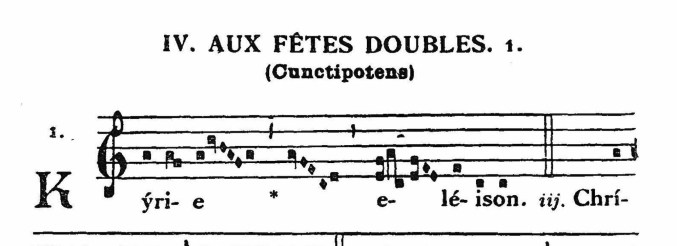 OT LONG AGO, my husband released 1,638 pages from an extremely rare book published in the 1930s. The book was created by DOM LUCIEN DAVID, a Benedictine monk who served as the personal secretary and biographer to Dom Joseph Pothier. My interests don’t lie in the history of plainsong. (I’m a professional photographer and mother.) Nevertheless, from my husband I have come to understand that Dom Pothier (d. 1923) was quite important to the history of Gregorian chant, which is the music proper to the Roman Rite. He tells me this edition by Pothier’s student is of monumental importance, and I take him at his word.
OT LONG AGO, my husband released 1,638 pages from an extremely rare book published in the 1930s. The book was created by DOM LUCIEN DAVID, a Benedictine monk who served as the personal secretary and biographer to Dom Joseph Pothier. My interests don’t lie in the history of plainsong. (I’m a professional photographer and mother.) Nevertheless, from my husband I have come to understand that Dom Pothier (d. 1923) was quite important to the history of Gregorian chant, which is the music proper to the Roman Rite. He tells me this edition by Pothier’s student is of monumental importance, and I take him at his word.
Option 1 of 3 • Corpus Christi Watershed paid to have the books by Dom Lucien professionally scanned. It goes without saying that PDF documents are crucial to those who utilize books over a long period of time, because of the ease and rapidity with which searches can be done. The following image allows one to examine the strengths and weaknesses of a professional scan:
![]()
![]()
Option 2 of 3 • Below is how the book by Dom Lucien looks as captured with my normal camera lens. You can see that it’s better than the professional scan:
![]()
![]()
Option 3 of 3 • Now consider the quality (as shown below) when captured with a special lens I obtained designed specifically to photograph old books. I think he will agree that it’s crisp and magnificent:
![]()
![]()
The Device Invented • We are grateful to Jeffrey’s friend, Matthew Frederes, who invented a special “manuscript display” device. We utilized that device to upload and display the books by Dom Lucien. From what I can tell, Matthew is obsessed with all these old plain-chant manuscripts, just like my husband.
* MOMENTOUS RELEASE! • Gradual & Vesperal by Pothier’s Protégé
—Contains 1,638 pages • Blog article released on 30 August 2023.
![]()
Restoring The Past • These books by Dom Lucien were quite old. To be precise, they were 91 years old. A photograph can often show details a scan won’t. Here’s an example:
![]()




